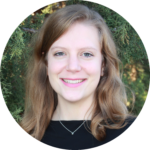WANT TO BE A NEW CHAPTER ALUMNI?
Apply online to share your accomplishments and endeavors.
APPLY TO BE FEATUREDFebruary 2026

Nashville, Tennessee
Postdoctoral fellow, Department of Biochemistry
Vanderbilt University
VIEW PROFILEAlexandra Blee, Ph.D. (BMB ’18), discovered an early shared passion for science with her dad, after following him around his laboratory as a child. A three-year stint in a research lab during college sealed the deal and empowered her to apply to graduate school at Mayo Clinic. Dr. Blee says she has long been captivated by the complex processes that drive multicellular life and the dysregulation of those same processes that leads to disease. “Throughout my scientific career, I have fostered this sense of curiosity and drive to investigate the intricacies of human disease while polishing the skills required to be an independent research scientist,” she says. Today Dr. Blee is a postdoctoral fellow at Vanderbilt University. She has merged her background in cancer biology, biochemistry and molecular biology with new structural biology perspectives to study mechanisms of dysfunctional DNA repair in cancer.
“Everyone had only positive things to say about the graduate program and Mayo environment. At every institution I interviewed with after that, I compared them to Mayo. Mayo Clinic set the bar.”
My dad, now a professor at California State University in Chico, was in graduate school when I was young. I grew up following him into the lab on weekends and getting his help on school science fair projects. Science has always been part of my life.
After my first year of college at the University of California, Davis, I joined a lab as an undergraduate researcher to gain experience. I had a great mentor, Soichiro Yamada, Ph.D., who kept me on for the remaining three years of college. He was influential in helping me narrow down my interests and deciding to pursue grad school.
My first grad school interview was at Mayo Clinic. I didn’t have preconceptions about Mayo but was totally blown away by its programs, perks and tight link with the clinic. As a biomedical researcher, I wanted to have connections to patients in my work.
Mayo also involves many current students in the recruitment interview process, so I got to talk with students about their experiences. Everyone had only positive things to say about the graduate program and Mayo environment. At every institution I interviewed with after that, I compared them to Mayo. Mayo Clinic set the bar.
Mayo has a pedigree and reputation that everyone knows. When people see Mayo Clinic on your CV, they assume you represent a high caliber.
I learned about work-life balance. It would be easy to work as hard as you can without taking breaks in the dynamic, fast-paced research environment at Mayo Clinic. The pace at which I hit the ground in the early days wasn’t sustainable for the duration of grad school.
Mayo Clinic recognizes the importance of and supports work-life balance. My adviser was supportive of balance, too. I took advantage of living in Minnesota and pursued other interests outdoors — biking, running and hiking. This lesson has been useful in my new position. This is my career, not a sprint.
At Mayo, under the fantastic mentorship of Haojie Huang, Ph.D. (LABM ’99), I became interested in studying mechanisms of therapy resistance in cancer. I worked to better understand a subset of heterogeneous prostate tumors and how they develop therapy resistance. Because I was at Mayo Clinic, I had unparalleled access to resources, including murine models, human prostate cancer cell lines and patient samples. I learned the value of multidisciplinary research and that studying even the most basic mechanisms of cancer progression has real power to translate to the clinic and help improve the lives of patients. I wanted to continue my research after my thesis and learn new perspectives and techniques.
This is my goal for my postdoctoral fellowship, training under Walter Chazin, Ph.D., at Vanderbilt University. This lab specializes in structural biology of DNA repair proteins. I’m learning biophysical and structural techniques so I can better address mechanisms of cancer biology down to the level of protein structure and function. I’m particularly interested in studying how genetic mutations impact protein activity and, ultimately, tumor behavior. I have a great team and mentor at Vanderbilt and look forward to seeing where my research takes me.
I plan to complete my fellowship within five years and then start my own multidisciplinary research lab to study how mutations in patient tumors impact sensitivity and response to therapies. I look forward to mentoring and teaching future trainees in my lab. I’ve benefited immeasurably from past mentors who have encouraged me throughout my research career. I want to pass that on.
Have a unique vision for your research or career path, and don’t be afraid to pave your own way. Build your own research niche, and learn a new field or set of techniques that plays to your strengths and passions. It pays off in the end to have a novel skill set or career path in which you’re the expert.
At the same time, build and maintain relationships with your mentors, members of your committee, and department faculty and collaborators. You never know when someone will give you great insight on a project or a piece of life advice. You can rely on that strong network throughout your career.
I love to bake and eat sourdough bread! To balance that out, I also run and bike. I enjoy hands-on crafts, too, and taught myself to knit and crochet during the Minnesota winters.
During my years at Mayo, I completed three 100-mile bike rides including the all-gravel Almanzo race that was hosted in Spring Valley, Minnesota. I also did the 70-mile Tour de Pepin ride.
See past New Chapter stories here.
Apply online to share your accomplishments and endeavors.
APPLY TO BE FEATURED